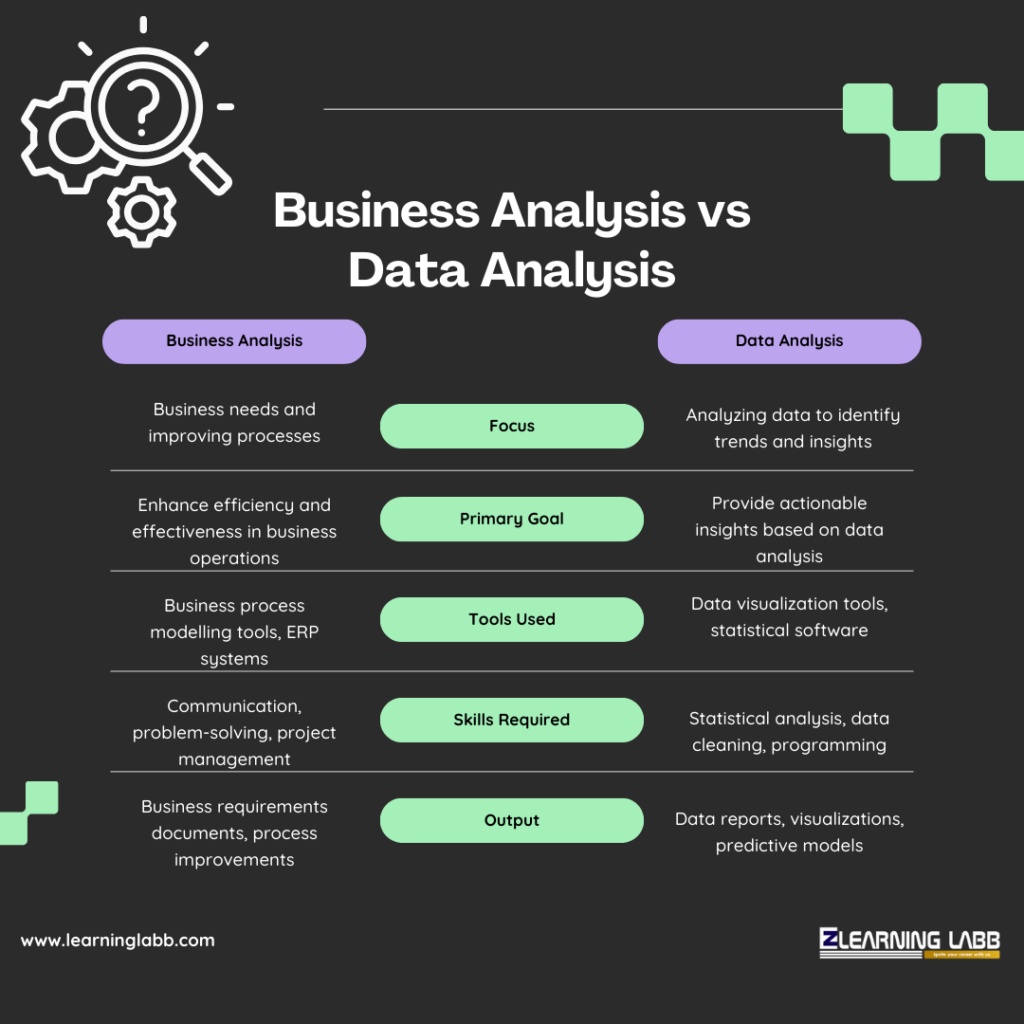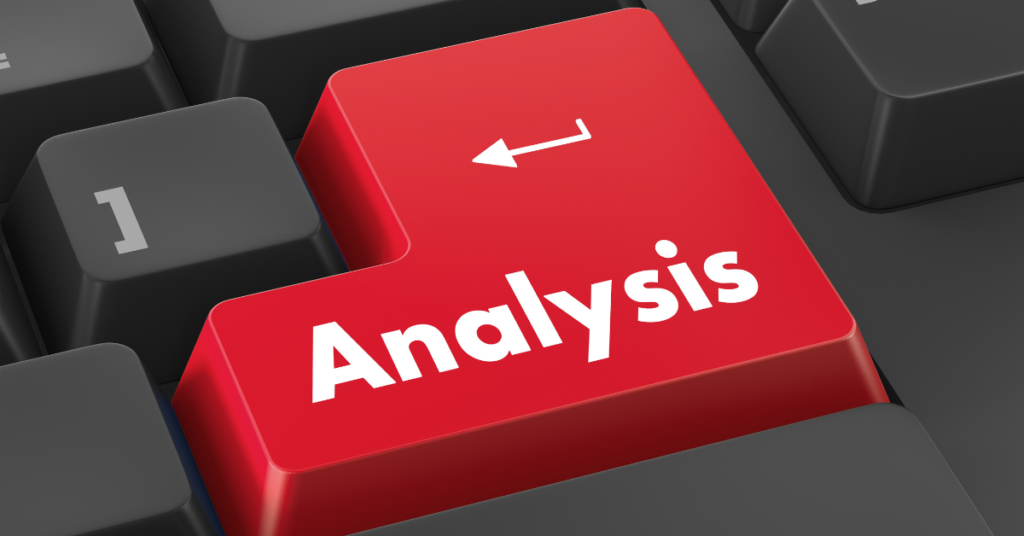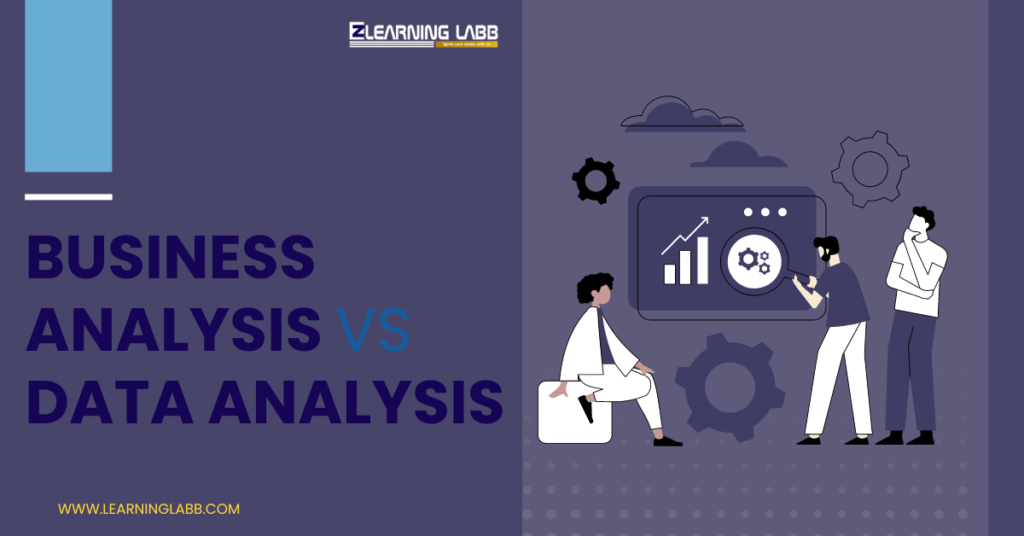Business Analysis vs Data Analysis: Data analysis is as popular as it comes – but what about business analysis? both business analysis and data analysis have become vital roles across industries. Both the roles of business analysis and data analysis play critical roles in decision-making processes within organizations.
While the two roles may seem similar, they differ in several key areas. Many professionals wonder, “Can a business analyst become a data analyst?” To answer this, we need to look deeper into the skills required for both roles and understand how they differ yet overlap.
If you’re a business analyst contemplating a shift to data analysis, or if you’re simply curious about the skills required, this blog by Learning Labb will provide you with all the necessary information into how these two roles compare and the important skills required to become data analyst.
This blog contains the following:
- What is business analysis?
- What is data analysis?
- Business analysis vs data analysis
- Can a business analyst become a data analyst?
- What are the skills required to become data analyst?
- Business analyst skills required
What is Business Analysis?
Business analysis revolves around identifying business needs, solving business problems, and improving processes. A business analyst works closely with stakeholders to define requirements and provide solutions that align with the company’s objectives. They focus on optimizing operations, improving efficiency, and driving growth. The role is highly strategic and requires strong communication and problem-solving skills.
What is Data Analysis?
Data analysis, on the other hand, deals with collecting, cleaning, and interpreting large data sets to identify trends, patterns, and insights. A data analyst uses statistical techniques and software tools to help businesses make data-driven decisions. Unlike a business analyst, a data analyst primarily focuses on data manipulation and analysis, often working with databases, coding, and analytical software.
Learn business analysis vs data analysis below:

Business Analysis vs Data Analysis: What Are The 5 Differences?
Business Analysis is concerned with identifying business needs and finding solutions to business problems. The primary objective is to improve business processes and efficiency.
Business analysts often use tools like business process modelling, flowcharts, and ERP systems. They rely heavily on communication and stakeholder management.
Data Analysis, on the other hand, focuses on examining data to uncover patterns, correlations, and insights that can guide business decisions. The goal is to provide a data-driven perspective to solve business problems.
Data analysts use statistical software, data visualization tools like Tableau, and programming languages like Python or R. They focus on data collection, cleaning, and analysis.
Can a Business Analyst Become a Data Analyst?
Yes, a business analyst can become a data analyst, but it does require additional training and skills. Since both business analysis and data analysis deal with information that supports decision-making, the transition is achievable. However, a business analyst must learn the more technical and quantitative aspects of data analysis to succeed.
The primary difference in business analysis vs data analysis lies in the scope of work. A business analyst generally focuses on improving processes and implementing solutions for business problems, while a data analyst focuses on processing and interpreting data to generate actionable insights.
A business analyst who is keen on transitioning to data analysis needs to learn specific technical skills such as SQL, Python, R, and data visualization tools like Tableau or Power BI. They also need to build proficiency in statistical methods and data cleaning techniques.
What Are The Skills Required To Become Data Analyst?
For business analysts looking to transition into data analysis, acquiring the right skill set is essential. Here’s a list of the skills required to become data analyst:
- Programming languages: Knowledge of programming languages like SQL, Python, and R is fundamental for data manipulation and analysis.
- Statistical knowledge: Understanding statistics is very important to analyzing data, identifying patterns, and making informed decisions.
- Data visualization: Tools like Tableau, Power BI, or Excel are commonly used for presenting data findings in a clear, visual manner.
- Database management: Data analysts work with large datasets stored in databases, so proficiency in database management and query languages like SQL is essential.
- Problem-solving abilities: Similar to business analysis, data analysis requires a strong ability to solve complex problems but with a focus on deriving insights from raw data.
These skills will allow a business analyst to transition smoothly into data analysis. While business analysis skills required for the job focus on process improvements and stakeholder communication, the skills required to become a data analyst lean more towards statistical analysis, programming, and technical data handling.

What About Business Analyst Skills Required?
While transitioning to a data analyst role, you can leverage several existing business analyst skills:
- Problem-solving: Your ability to solve complex business problems will help you identify data-driven solutions.
- Communication: Strong communication skills will aid in translating data insights into business recommendations.
- Business context: Your deep understanding of business operations will help you analyze data within the appropriate context, leading to more relevant insights.
Business Analysis vs Data Analysis – The Final Verdict
In the comparison of business analysis vs data analysis, both roles play significant yet different parts in helping organizations grow. While business analysis focuses on solving business problems and improving processes, data analysis revolves around interpreting data to provide actionable insights.
The question “Can a business analyst become a data analyst?” is answered with a confident yes. With the right skills required to become a data analyst, a business analyst can seamlessly make the switch to a data-driven role.
Ultimately, it all lies in your skill in understanding the business analyst skills required and the technical skills required to become a data analyst. With dedication and a focus on building the right competencies, transitioning from business analysis to data analysis can open up new career opportunities and expand your skill and expertise.
Click here to learn more about business analysis, and data analysis.





